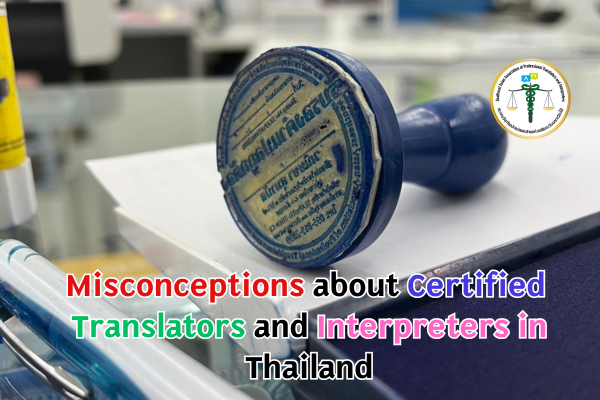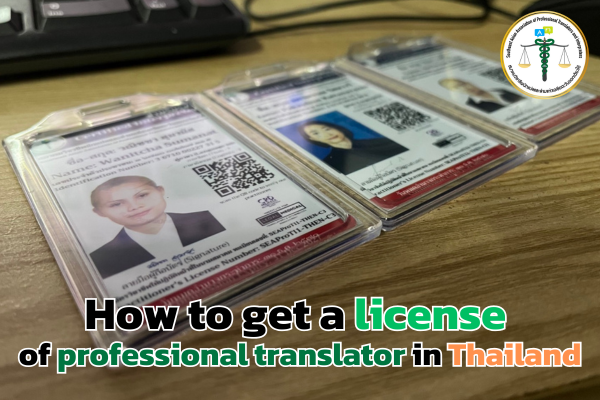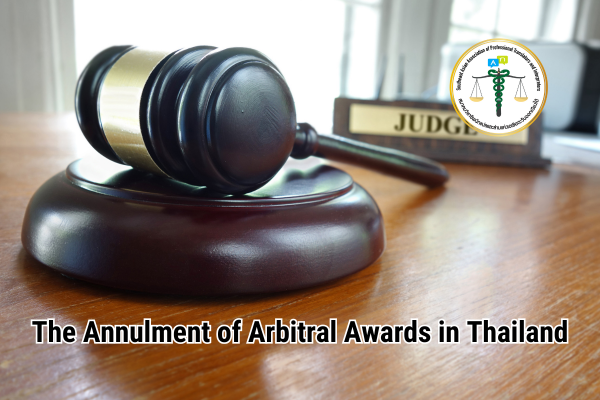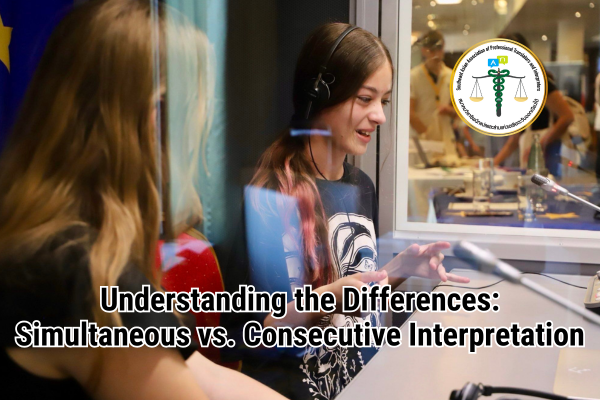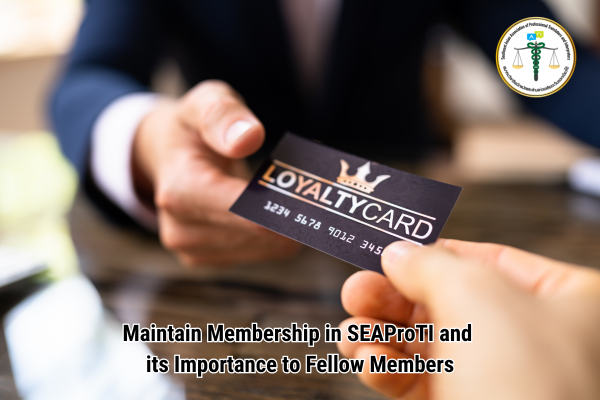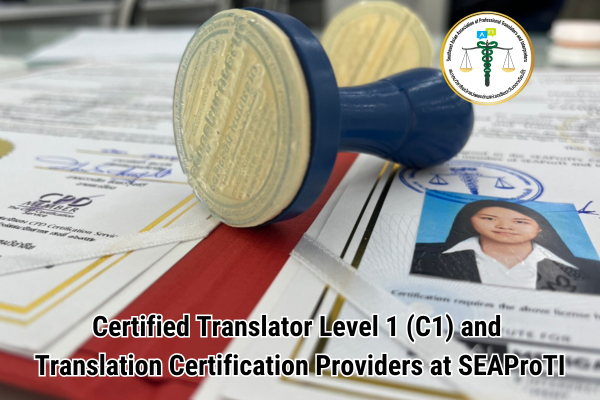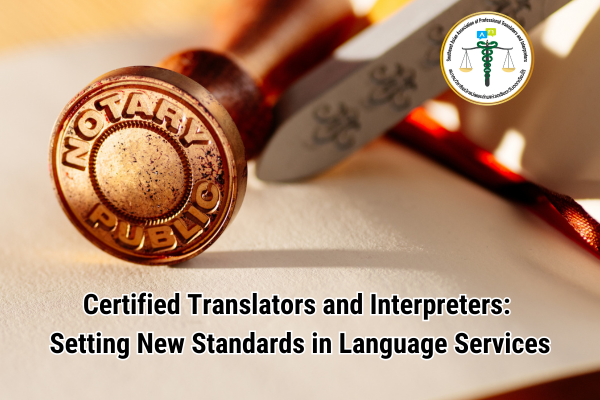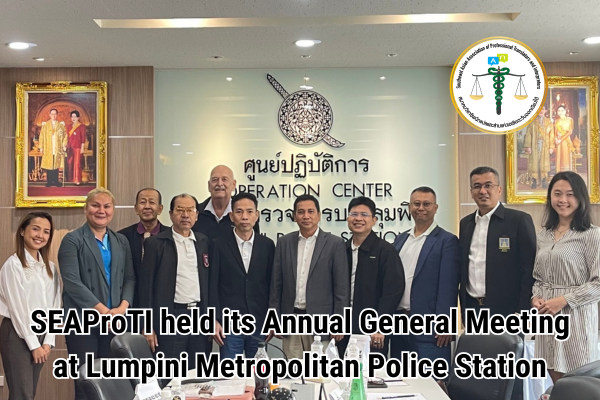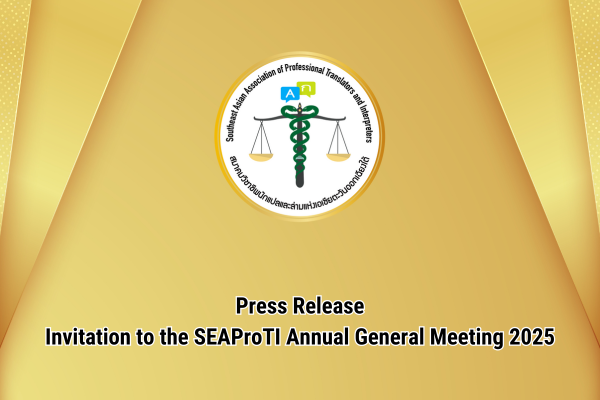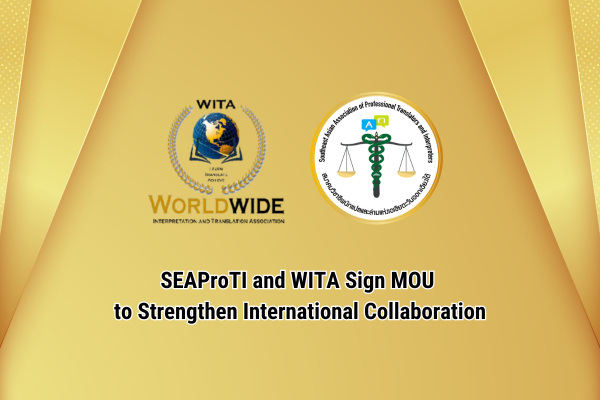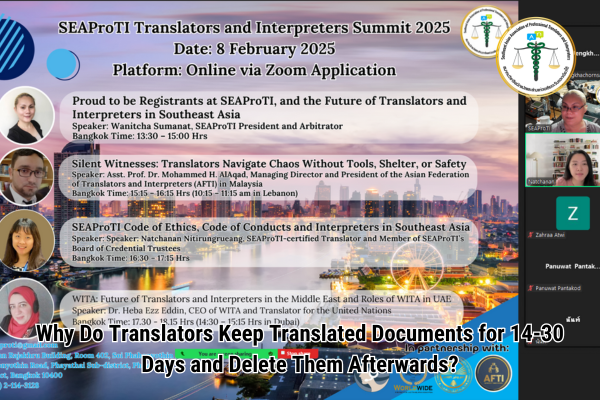Misconceptions About Certified Translators and Interpreters in Thailand
Translation and interpreting are critical services in today’s globalized world, where language barriers can create significant challenges in legal, medical, business, and diplomatic contexts. In Thailand, certified translators and interpreters play an essential role in ensuring the accuracy and reliability of communication. However, misconceptions about these professionals—and the certification processes—persist. This article will address three common misconceptions and clarify the facts about certified translators, interpreters, and related services in Thailand.
Misconception 1: Anyone Can Provide Certified Translations in Thailand
A widespread misunderstanding is that anyone fluent in two languages can provide certified translations. This is not accurate. Only certified translators can legally provide certified translations in Thailand. Certified translators possess the necessary qualifications and credentials that ensure their translations meet the required standards of accuracy and professionalism.
Certified translators in Thailand are registered with the Southeast Asian Association of Professional Translators and Interpreters (SEAProTI). SEAProTI is the only recognized body in Thailand authorized to certify translators and interpreters. This certification ensures that professionals meet stringent standards, including language proficiency, subject-matter expertise, and adherence to ethical practices.
The misconception that uncertified individuals can provide certified translations arises partly because some people assume fluency in a language is sufficient for translation work. However, certified translations require more than just linguistic skills; they demand a deep understanding of cultural nuances, technical terminology, and legal requirements. For instance, a certified translator must ensure that legal documents like contracts, wills, and court transcripts are translated with absolute precision to avoid any misinterpretation or disputes.
SEAProTI-certified translators undergo rigorous testing and evaluation. Their certification guarantees that their translations are accurate, reliable, and adhere to the highest professional standards. This distinction is crucial for individuals and organizations seeking certified translations, as uncertified translations may not be accepted by courts, government agencies, or international institutions.
Misconception 2: Certified Translators and Interpreters in Thailand Are Registered by Government Agencies
Another common misconception is that certified translators and interpreters in Thailand are registered or endorsed by government agencies. This is incorrect. While some countries have government agencies that certify translators, Thailand’s system is different.
Certified translators and interpreters in Thailand are certified by SEAProTI, a professional association recognized nationally and internationally for its standards. SEAProTI’s certification system is outlined in Sections 9 and 10 of the Royal Thai Government Gazette, issued on July 25, 2024. This landmark announcement officially recognized SEAProTI-certified professionals, marking a significant step in the professionalization of translation and interpreting services in Thailand.
The Royal Thai Government Gazette explicitly defines the role and responsibilities of certified translators and interpreters. It establishes that SEAProTI-certified professionals are the only individuals authorized to provide certified translations and interpretations in Thailand. This recognition ensures that certified translators and interpreters meet the highest standards of competence and ethics, providing a reliable resource for individuals and organizations requiring their services.
Government agencies and courts in Thailand rely on SEAProTI-certified translators and interpreters for official purposes. For instance, a certified interpreter may be required during legal proceedings involving foreign nationals, where precise communication is vital. Similarly, certified translations of documents such as birth certificates, marriage certificates, and academic transcripts are often required for visa applications, legal cases, and other official purposes.
Misconception 3: Notarial Service Attorney (NSA) Is the Same as Notary Public
The terms “Notarial Service Attorney (NSA)” and “Notary Public” are often used interchangeably in Thailand, leading to confusion. However, they are not the same.
A Notarial Service Attorney (NSA) in Thailand is trained and registered with the Lawyers’ Council of Thailand. An NSA is authorized to perform certain legal functions, such as certifying documents, verifying signatures, and administering oaths. This designation is specific to Thailand and differs from the concept of a Notary Public in countries that are signatories to The Hague Convention.
A Notary Public, as defined under The Hague Convention, is an individual appointed by the government to perform legal formalities, particularly for international use. In Thailand, Notaries Public are rare, and their functions are typically handled by NSAs. While both roles involve certifying documents and verifying identities, their legal frameworks and scopes of authority differ significantly.
For example, if a Thai citizen requires a document notarized for use in a foreign country, the service provided by an NSA may not be sufficient. In such cases, the individual may need to seek a Notary Public or have the document authenticated by the Ministry of Foreign Affairs. This distinction highlights the importance of understanding the differences between NSAs and Notaries Public to ensure compliance with legal requirements.
The misconception that NSAs and Notaries Public are identical can lead to complications, especially in international legal matters. It is crucial for individuals and businesses to consult with qualified professionals to determine the appropriate certification or notarization required for their specific needs.
Conclusion
Misconceptions about certified translators, interpreters, and related services in Thailand can have serious consequences. Understanding the facts is essential for individuals and organizations relying on these services for legal, medical, business, or personal purposes. Here are the key takeaways:
-
Certified Translations: Only SEAProTI-certified translators can provide certified translations in Thailand. These professionals undergo rigorous training and evaluation to ensure their work meets the highest standards.
-
Certification Authority: Certified translators and interpreters in Thailand are not registered by government agencies. Instead, they are certified by SEAProTI, a professional association officially recognized by the Royal Thai Government.
-
Notarial Services: Notarial Service Attorneys (NSAs) and Notaries Public serve different functions. NSAs are specific to Thailand and are registered with the Lawyers’ Council, while Notaries Public operate under international conventions and are rare in Thailand.
By dispelling these misconceptions, we can promote a better understanding of the vital role played by certified translators and interpreters in Thailand. Accurate and reliable translation and interpretation services are indispensable in today’s interconnected world, and the professionalization of these services through organizations like SEAProTI ensures that they meet the highest standards of quality and integrity.
About SEAProTI’s certified translators, translation certification providers, and certified interpreters:
The Southeast Asian Association of Professional Translators and Interpreters (SEAProTI) has officially announced the criteria and qualifications for individuals to register as “Certified Translators,” “Translation Certification Providers,” and “Certified Interpreters” under the association’s regulations. These guidelines are detailed in Sections 9 and 10 of the Royal Thai Government Gazette, issued by the Secretariat of the Cabinet under the Office of the Prime Minister of the Kingdom of Thailand, dated July 25, 2024, Volume 141, Part 66 Ng, Page 100.
To read the full publication, visit: the Royal Thai Government Gazette
ความเข้าใจผิดเกี่ยวกับนักแปลและล่ามรับรองในประเทศไทย
การแปลและล่ามเป็นบริการที่มีความสำคัญในโลกยุคโลกาภิวัตน์ ซึ่งอุปสรรคทางภาษาอาจก่อให้เกิดความท้าทายอย่างมากในด้านกฎหมาย การแพทย์ ธุรกิจ และการทูต ในประเทศไทย นักแปลและล่ามรับรองมีบทบาทสำคัญในการสื่อสารที่ถูกต้องและน่าเชื่อถือ อย่างไรก็ตาม ยังคงมีความเข้าใจผิดเกี่ยวกับผู้เชี่ยวชาญเหล่านี้ รวมถึงกระบวนการรับรองที่เกี่ยวข้องอยู่มาก บทความนี้จะอธิบายความเข้าใจผิดที่พบบ่อย 3 ประการ พร้อมข้อเท็จจริงที่เกี่ยวข้องกับนักแปล ล่าม และบริการที่เกี่ยวข้องในประเทศไทย
ความเข้าใจผิดที่ 1: ใคร ๆ ก็สามารถให้บริการแปลรับรองได้ในประเทศไทย
ความเชื่อผิด ๆ ที่แพร่หลายคือ ทุกคนที่สามารถพูดได้สองภาษาสามารถให้บริการแปลรับรองได้ ความจริงแล้วมีเพียง นักแปลรับรอง เท่านั้นที่สามารถให้บริการแปลรับรองได้ตามกฎหมายในประเทศไทย
นักแปลรับรอง คือนักแปลที่ผ่านการรับรองและมีคุณสมบัติตรงตามมาตรฐาน ทั้งด้านความแม่นยำและความเป็นมืออาชีพ โดยนักแปลรับรองในประเทศไทยจะต้องลงทะเบียนกับ สมาคมวิชาชีพนักแปลและล่ามแห่งเอเชียตะวันออกเฉียงใต้ (SEAProTI) ซึ่งเป็นองค์กรเดียวที่ได้รับการยอมรับในประเทศไทยในการรับรองนักแปลและล่าม
การแปลรับรองไม่ได้ขึ้นอยู่กับความสามารถทางภาษาเพียงอย่างเดียว แต่ต้องการความเข้าใจลึกซึ้งเกี่ยวกับ บริบททางวัฒนธรรม ศัพท์เทคนิค และข้อกำหนดทางกฎหมาย ตัวอย่างเช่น ในการแปลเอกสารทางกฎหมาย เช่น สัญญา พินัยกรรม หรือบันทึกศาล นักแปลรับรองต้องแปลด้วยความแม่นยำสูงสุด เพื่อหลีกเลี่ยงการตีความผิดพลาดหรือข้อพิพาท
นักแปลรับรองของ SEAProTI ต้องผ่านการทดสอบและประเมินอย่างเข้มงวด ซึ่งรับรองได้ว่างานแปลของพวกเขามีคุณภาพและปฏิบัติตามมาตรฐานวิชาชีพสูงสุด สิ่งนี้มีความสำคัญสำหรับผู้ที่ต้องการการแปลรับรอง เนื่องจากงานแปลที่ไม่ได้รับการรับรองอาจไม่ผ่านการยอมรับจากศาล หน่วยงานราชการ หรือสถาบันระหว่างประเทศ
ความเข้าใจผิดที่ 2: นักแปลและล่ามรับรองในประเทศไทยขึ้นทะเบียนกับหน่วยงานของรัฐ
ความเข้าใจผิดอีกประการหนึ่งคือ นักแปลและล่ามรับรองในประเทศไทยต้องขึ้นทะเบียนหรือได้รับการรับรองจากหน่วยงานของรัฐ ซึ่งความจริงแล้วระบบในประเทศไทยแตกต่างออกไป
นักแปลและล่ามรับรอง ในประเทศไทยได้รับการรับรองจาก SEAProTI ซึ่งเป็นสมาคมวิชาชีพที่ได้รับการยอมรับทั้งในระดับประเทศและนานาชาติ โดยระบบการรับรองของ SEAProTI ถูกกำหนดไว้ใน ข้อที่ 9 และ 10 ของราชกิจจานุเบกษาแห่งราชอาณาจักรไทย ซึ่งประกาศเมื่อวันที่ 25 กรกฎาคม 2567
ราชกิจจานุเบกษาได้กำหนดบทบาทและหน้าที่ของนักแปลและล่ามรับรองไว้อย่างชัดเจน โดยระบุว่า นักแปลและล่ามที่ได้รับการรับรองจาก SEAProTI เท่านั้นที่มีสิทธิ์ให้บริการแปลรับรองและล่ามรับรองในประเทศไทย เพราะมีปรากฎชัดเจนในราชกิจจานุเบกษา
ตัวอย่างเช่น ศาลและหน่วยงานราชการในประเทศไทยมักใช้บริการของนักแปลและล่ามรับรองจาก SEAProTI ในกระบวนการทางกฎหมายที่เกี่ยวข้องกับชาวต่างชาติ ซึ่งการสื่อสารที่ถูกต้องถือเป็นสิ่งสำคัญอย่างยิ่ง เช่นเดียวกับเอกสารที่ต้องการการแปลรับรอง เช่น สูติบัตร ทะเบียนสมรส หรือใบแสดงผลการศึกษา ที่มักถูกใช้ในกระบวนการขอวีซ่า คดีความ และเรื่องราชการอื่น ๆ
ความเข้าใจผิดที่ 3: ทนายความผู้ทำคำรับรองเอกสาร (Notarial Service Attorney – NSA) และ Notary Public เหมือนกัน
คำว่า “ทนายความผู้ทำคำรับรองเอกสาร” (NSA) และ “Notary Public” มักถูกเข้าใจว่าเหมือนกันในประเทศไทย แต่ในความเป็นจริง ทั้งสองมีความแตกต่างกัน
ทนายความผู้ทำคำรับรองเอกสาร (NSA) ในประเทศไทยคือตำแหน่งที่ต้องผ่านการอบรมและลงทะเบียนกับ สภาทนายความแห่งประเทศไทย โดย NSA มีอำนาจดำเนินการทางกฎหมายบางประการ เช่น รับรองเอกสาร รับรองลายมือชื่อ และการสาบานตน ซึ่งตำแหน่งนี้เป็นเฉพาะในประเทศไทย และแตกต่างจาก Notary Public ในประเทศที่เป็นภาคีของ อนุสัญญากรุงเฮก
ในขณะที่ Notary Public หมายถึงบุคคลที่รัฐบาลแต่งตั้งให้ดำเนินการรับรองเอกสารเพื่อใช้ในระดับสากล ซึ่งในประเทศไทย Notary Public ค่อนข้างหายาก และหน้าที่ส่วนใหญ่จะดำเนินการโดย NSA
ตัวอย่างเช่น หากพลเมืองไทยต้องการเอกสารที่ได้รับการรับรองเพื่อใช้ในต่างประเทศ บริการของ NSA อาจไม่เพียงพอ ในกรณีนี้อาจต้องหาบริการ Notary Public หรือส่งเอกสารไปขอการรับรองจากกระทรวงการต่างประเทศ
บทสรุป
ความเข้าใจผิดเกี่ยวกับนักแปล ล่ามรับรอง และบริการที่เกี่ยวข้องในประเทศไทย อาจนำไปสู่ผลกระทบร้ายแรง การเข้าใจข้อเท็จจริงจึงเป็นสิ่งสำคัญสำหรับบุคคลหรือองค์กรที่พึ่งพาบริการเหล่านี้
ประเด็นสำคัญที่ควรทราบ:
-
การแปลรับรอง: มีเพียงนักแปลรับรองของ SEAProTI เท่านั้นที่สามารถให้บริการแปลรับรองในประเทศไทยได้ โดยนักแปลเหล่านี้ต้องผ่านการฝึกอบรมและการประเมินที่เข้มงวด
-
หน่วยงานรับรอง: นักแปลและล่ามรับรองในประเทศไทยไม่ได้ขึ้นทะเบียนกับหน่วยงานของรัฐ แต่ได้รับการรับรองจาก SEAProTI ซึ่งเป็นสมาคมวิชาชีพที่ได้รับการยอมรับอย่างเป็นทางการ
-
บริการรับรองเอกสาร: ทนายความผู้ทำคำรับรองเอกสาร (NSA) และ Notary Public มีบทบาทหน้าที่แตกต่างกัน โดย NSA เป็นตำแหน่งเฉพาะในประเทศไทย ในขณะที่ Notary Public มีหน้าที่ในระดับสากล
เกี่ยวกับ SEAProTI:
สมาคมวิชาชีพนักแปลและล่ามแห่งเอเชียตะวันออกเฉียงใต้ (SEAProTI) ได้กำหนดหลักเกณฑ์และคุณสมบัติสำหรับผู้ที่จะขึ้นทะเบียนเป็น “นักแปลรับรอง” “ผู้ให้บริการรับรองการแปล” และ “ล่ามรับรอง” ตามข้อกำหนดของสมาคม ซึ่งระบุใน ข้อที่ 9 และ 10 ของราชกิจจานุเบกษา ที่ออกโดยสำนักเลขาธิการคณะรัฐมนตรี เมื่อวันที่ 25 กรกฎาคม 2567
เกี่ยวกับนักแปลรับรอง ผู้รับรองการแปล และล่ามรับรองของสมาคมวิชาชีพนักแปลและล่ามแห่งเอเชียตะวันออกเฉียงใต้
สมาคมวิชาชีพนักแปลและล่ามแห่งเอเชียตะวันออกเฉียงใต้ (SEAProTI) ได้ประกาศหลักเกณฑ์และคุณสมบัติผู้ที่ขึ้นทะเบียนเป็น “นักแปลรับรอง (Certified Translators) และผู้รับรองการแปล (Translation Certification Providers) และล่ามรับรอง (Certified Interpreters)” ของสมาคม หมวดที่ 9 และหมวดที่ 10 ในราชกิจจานุเบกษา ของสำนักเลขาธิการคณะรัฐมนตรี ในสำนักนายกรัฐมนตรี แห่งราชอาณาจักรไทย ลงวันที่ 25 ก.ค. 2567 เล่มที่ 141 ตอนที่ 66 ง หน้า 100 อ่านฉบับเต็มได้ที่: นักแปลรับรอง ผู้รับรองการแปล และล่ามรับรอง


